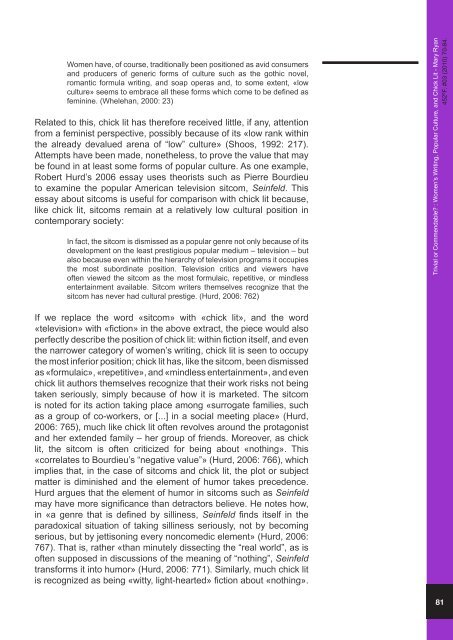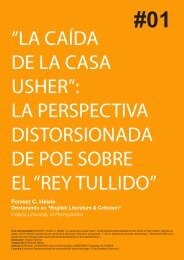03 - 452ºF
03 - 452ºF
03 - 452ºF
You also want an ePaper? Increase the reach of your titles
YUMPU automatically turns print PDFs into web optimized ePapers that Google loves.
Women have, of course, traditionally been positioned as avid consumers<br />
and producers of generic forms of culture such as the gothic novel,<br />
romantic formula writing, and soap operas and, to some extent, «low<br />
culture» seems to embrace all these forms which come to be defined as<br />
feminine. (Whelehan, 2000: 23)<br />
Related to this, chick lit has therefore received little, if any, attention<br />
from a feminist perspective, possibly because of its «low rank within<br />
the already devalued arena of “low” culture» (Shoos, 1992: 217).<br />
Attempts have been made, nonetheless, to prove the value that may<br />
be found in at least some forms of popular culture. As one example,<br />
Robert Hurd’s 2006 essay uses theorists such as Pierre Bourdieu<br />
to examine the popular American television sitcom, Seinfeld. This<br />
essay about sitcoms is useful for comparison with chick lit because,<br />
like chick lit, sitcoms remain at a relatively low cultural position in<br />
contemporary society:<br />
In fact, the sitcom is dismissed as a popular genre not only because of its<br />
development on the least prestigious popular medium – television – but<br />
also because even within the hierarchy of television programs it occupies<br />
the most subordinate position. Television critics and viewers have<br />
often viewed the sitcom as the most formulaic, repetitive, or mindless<br />
entertainment available. Sitcom writers themselves recognize that the<br />
sitcom has never had cultural prestige. (Hurd, 2006: 762)<br />
If we replace the word «sitcom» with «chick lit», and the word<br />
«television» with «fiction» in the above extract, the piece would also<br />
perfectly describe the position of chick lit: within fiction itself, and even<br />
the narrower category of women’s writing, chick lit is seen to occupy<br />
the most inferior position; chick lit has, like the sitcom, been dismissed<br />
as «formulaic», «repetitive», and «mindless entertainment», and even<br />
chick lit authors themselves recognize that their work risks not being<br />
taken seriously, simply because of how it is marketed. The sitcom<br />
is noted for its action taking place among «surrogate families, such<br />
as a group of co-workers, or [...] in a social meeting place» (Hurd,<br />
2006: 765), much like chick lit often revolves around the protagonist<br />
and her extended family – her group of friends. Moreover, as chick<br />
lit, the sitcom is often criticized for being about «nothing». This<br />
«correlates to Bourdieu’s “negative value”» (Hurd, 2006: 766), which<br />
implies that, in the case of sitcoms and chick lit, the plot or subject<br />
matter is diminished and the element of humor takes precedence.<br />
Hurd argues that the element of humor in sitcoms such as Seinfeld<br />
may have more significance than detractors believe. He notes how,<br />
in «a genre that is defined by silliness, Seinfeld finds itself in the<br />
paradoxical situation of taking silliness seriously, not by becoming<br />
serious, but by jettisoning every noncomedic element» (Hurd, 2006:<br />
767). That is, rather «than minutely dissecting the “real world”, as is<br />
often supposed in discussions of the meaning of “nothing”, Seinfeld<br />
transforms it into humor» (Hurd, 2006: 771). Similarly, much chick lit<br />
is recognized as being «witty, light-hearted» fiction about «nothing».<br />
Trivial or Commendable? : Women’s Writing, Popular Culture, and Chick Lit - Mary Ryan<br />
<strong>452ºF</strong>. #<strong>03</strong> (2010) 70-84.<br />
81










